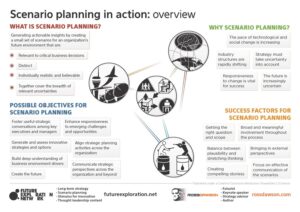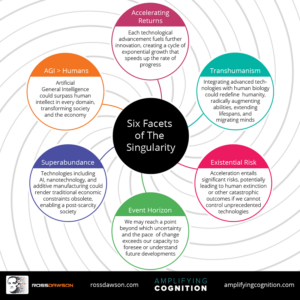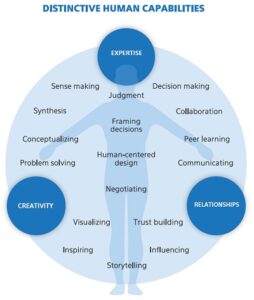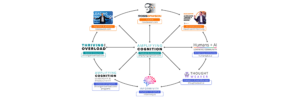
For a couple of decades San Francisco has been my ‘second city’ after Sydney, where I’ve gotten to know the city, built a network of fascinating people, and run a number of conferences.
After a break during Covid, I’ve been back briefly 4 times in the last 8 months, usually en-route to US speaking gigs, catching up with people, going to events, and getting a bit of a feel for the city post-pandemic.
In my conversations here I’ve experienecd deep division of opinions on the state and future of San Francisco, with some seeing it as well past its peak following an exodus over the last years (“it’s a shithole”), while others believe it is in the early stages of a renaissance (“everyone’s coming back”).
As a visitor I don’t personally experience the issues facing the city to any significant degree, but it is interesting to reflect on some of the factors and how those may play out.
Knowledge networks, especially in AI. The Bay Area has long been the global leader in tech startups, substantially due to the intensity of world-leading expertise in the region. Those on the edge learn from each other, and want to be here to keep ahead. With AI transforming the world and AI capabilities centered on San Francisco, people are coming back to town.
Reversion of remote work. Many people left the city when remote work was possible and encouraged. Now many tech and other companies are enforcing back-to-office, resulting in people moving back to the city. However this ismight be a short-term trend. The degree to which tech companies hire remote or local workers will fundamentally shape the city.
San Francisco vs Silicon Valley. During the 2010s I observed a substantial shift in the center of gravity of tech from mid to lower Silicon Valley to San Francisco. All the major tech companies located in the Valley set up SF offices, some relocated, and many new companies set up in the city. Not least in the reasons was that young dynanic people wanted to live in a vibrant city, not in the ‘burbs. The center of gravity could shift back, but the city is still vibrant, with most major AI companies in San Francisco. Venture capital is equally available across the Bay Area, though some investors prefer or mandate that companies are in the region.
Inequality, crime, drugs, and homelessness. The city’s social problems are legion, impacting the poor and making some parts of the city dangerous and unpleasant. Extreme wealth disparities inevitably create deep challenges, and there is little prospect of these easing. San Francisco apparently has the lowest proportion of young children of any city in the US, with parents choosing to live elsewwhere.
Real estate prices and cost of living. Many have already left the city due to the high cost of housing, though this applies across most of the Bay Area. As seen in other cities, the cost of living could drive out more of the creative community that helped to make San Francisco the colorful, dynamic city that it has been for many decades.
Politics. In short, there is much current or future city governments could do to improve the city, but it is highly uncertain whether they will be effective.
Transport. Improved transport could enable people to live outside the city but work in San Francisco, balancing quality of life and work demands. The prospects for dramatically better public transport in the foreseeable future are low. However autonomous car or buses could allow low-cost transport for many.
Regulation and tax. A number of companies have relocated out of San Francisco and California due to higher taxes and a greater regulatory burden. The advantages of being located in the city, such as access to talent and tech ecosystems, need to outweigh these costs.
Community and values. There are extremely strong communities in San Francisco, many building strong bonds through doing ventures together. Many people have aligned values around positive social impact and expanding consciousness, with these communities sometimes harder to find in other US cities.
Personally I have found it exceptionally intellectually stimulating being here in recent visits and I intend to get back more. It still feels like a second home to me, so I hope that it prospers.
- SEO Powered Content & PR Distribution. Get Amplified Today.
- PlatoData.Network Vertical Generative Ai. Empower Yourself. Access Here.
- PlatoAiStream. Web3 Intelligence. Knowledge Amplified. Access Here.
- PlatoESG. Automotive / EVs, Carbon, CleanTech, Energy, Environment, Solar, Waste Management. Access Here.
- BlockOffsets. Modernizing Environmental Offset Ownership. Access Here.
- Source: https://rossdawson.com/is-san-francisco-coming-back-factors-shaping-future/
- :has
- :is
- :not
- :where
- $UP
- 8
- 9
- a
- access
- across
- advantages
- After
- ahead
- AI
- aligned
- All
- allow
- already
- an
- and
- any
- ARE
- AREA
- around
- AS
- autonomous
- autonomous car
- available
- back
- balancing
- Bay
- BE
- been
- being
- believe
- Better
- Bit
- Bonds
- Break
- briefly
- Building
- built
- burden
- Buses
- but
- california
- capabilities
- capital
- car
- Center
- centered
- challenges
- Children
- choosing
- Cities
- City
- colorful
- coming
- Communities
- community
- Companies
- conferences
- Consciousness
- conversations
- Cost
- Costs
- could
- Couple
- Covid
- create
- Creative
- Crime
- Current
- Dangerous
- decades
- deep
- Degree
- demands
- Division
- do
- doing
- Dont
- dramatically
- drive
- Drugs
- due
- during
- dynamic
- each
- Early
- easing
- Ecosystems
- Edge
- Effective
- enable
- encouraged
- enforcing
- equally
- especially
- estate
- events
- Exodus
- expanding
- experience
- expertise
- extreme
- extremely
- facing
- factors
- fascinating
- feel
- Find
- following
- For
- foreseeable
- found
- Francisco
- from
- fundamentally
- future
- get
- getting
- gigs
- Global
- going
- Governments
- gravity
- greater
- harder
- Have
- helped
- here
- High
- higher
- highly
- hire
- Home
- hope
- housing
- How
- However
- HTTPS
- i
- Impact
- impacting
- improve
- improved
- in
- In other
- inevitably
- intend
- interesting
- Investors
- issues
- IT
- ITS
- Keep
- Know
- Last
- leader
- LEARN
- least
- left
- legion
- Life
- like
- little
- live
- living
- local
- located
- Long
- Low
- low-cost
- lower
- lowest
- major
- make
- Making
- mandate
- many
- many people
- May..
- me
- Mid
- months
- more
- most
- moving
- much
- my
- Need
- network
- networks
- New
- now
- number
- observed
- of
- offices
- on
- Opinions
- or
- Other
- Others
- out
- outside
- over
- parents
- parts
- past
- Peak
- People
- Personally
- plato
- Plato Data Intelligence
- PlatoData
- Play
- poor
- positive
- possible
- post-pandemic
- prefer
- Prices
- problems
- proportion
- prospect
- prospects
- public
- quality
- reasons
- recent
- reflect
- region
- regulatory
- Relocated
- remote
- remote work
- Renaissance
- resulting
- Run
- San
- San Francisco
- Second
- seeing
- seen
- set
- Shape
- shaping
- shift
- Short
- short-term
- significant
- Silicon
- Silicon Valley
- So
- Social
- Social impact
- some
- speaking
- stages
- Startups
- State
- Still
- strong
- substantial
- substantially
- such
- sydney
- Talent
- Taxes
- tech
- tech companies
- tech startups
- that
- The
- The State
- the world
- There.
- These
- they
- this
- those
- though?
- Through
- times
- to
- together
- transforming
- transport
- Trend
- Uncertain
- us
- usually
- Valley
- Values
- venture
- venture capital
- Ventures
- vibrant
- Visitor
- Visits
- vs
- want
- wanted
- was
- Wealth
- WELL
- when
- whether
- which
- while
- will
- with
- Work
- workers
- world
- years
- young
- zephyrnet











